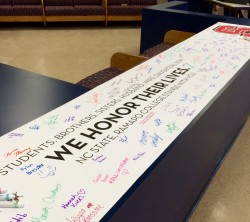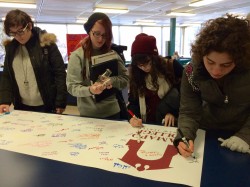By YOVANNA GARCIA
A grand jury indicted the man who fatally shot three Muslim students over an alleged parking dispute in Chapel Hill, North Carolina on Feb. 17, initiating a national conversation on religion and race.
The national issue has even made local Muslim community members fearful of displaying signs of a non-Christian faith.
“I, as a muslim woman who wears hijab, the head scarf, haven’t really felt this afraid for myself in years even after 9/11,” said Radwa Abdallah, a senior at Ramapo. “The idea that I essentially carry a target on the back of my head is a daunting feeling.”
Craig Hicks, 46, is the accused perpetrator of the heinous crime and a self-described atheist. His Facebook page reveals his anti-religion stance, and the victims’ relatives say he was resentful towards the female Muslim victims because they wore headscarves.
Abdallah mentioned that due to the recent events, going into new places is frightful for Muslims. In fact, the Muslim community has begun offering seminars focused on making members of this community seem more approachable in addition to offering defense classes for muslim women and initiating open houses that welcome non-muslims.
Hicks was indicted on three counts of first-degree murder and charged with discharging a firearm into an occupied dwelling, according to the Durham County Clerk’s office.

A calculated hate crime
Paul Reck, professor of sociology at Ramapo linked the lack of immediate media coverage to the lack of empathy that exists for non-black victims when the perpetrator is white.
“Typically when it’s other people of color, the hate-crime narrative doesn’t seem to resonate with people in the same way it does when it’s a white person victimizing a black person,” said Reck. “People can understand that because it makes sense in terms of the historical narrative, but it doesn’t sit the same way for other groups of color because there isn’t the same historical legacy.
“There’s an ethnocentrism that’s built in media coverage in the United States because some people are not seen as being more American than others, and therefore, they don’t get the same media attention and receive relatively minimal coverage,” added Reck. “For many people who operate and control the media, being white and Christian seem to be synonyms for American.”
Despite the national media’s lack of coverage on the severity of the crime, the public outcry of Arab and Muslim communities on whether or not the violent murder was, instead, a calculated hate crime is under investigation by the FBI.
If one thing is clear to me, it is that the violent attack on the three victims, Deah Barakat, 23, Yusor Abu-Salha, 21, and Razan Abu-Salha, 19, is just another reminder of the fact that Islamophobia is alive and well in America.
Individuals do not have to look further than their local movie theatres to see that the national media constantly vilifies Muslim people.
“American Sniper,” the film directed by Clint Eastwood and starring Bradley Cooper, depicts a US soldier fighting in Iraq and certainly encourages violence against Muslims.
“The film is just more of the negative Military propaganda that vilifies Arab people and paints them as savages,” said Abdallah. “It is based off the story of a man who is claimed to be an “American Hero,” and gives people who may already harbor a hateful sentiment towards muslims a push or an incentive to attack Muslims.”
Sister of one of the victims, Dr. Suzanne Barakat, on Feb. 20 also listed the film as part of the culture of Islamophobia in America in an interview with CNN.
The anti-Islamic behavior of white Americans who believe that all Muslims are terrorists responsible for the 9/11 attacks on the World Trade Center is inexcusable and downright shameful.
Even President Barack Obama on Friday called the Muslim student’s fatal shootings “brutal and outrageous,” according to the Washington Post.

Consequence of Islamophobic attitudes post 9-11
Americans are so quick to discredit the young lives and potential of the fatal victims because of their religion, but never stop to think how their idealistic views are flawed and inappropriate.
“The past 14 years since 9/11 has heavily affected the way Muslims and Arabs function,” said Abdallah. “Muslims are seen as a threat and that is the issue, we’ve lost our humanity in the eyes of a lot of americans. So when we are seen as a threat, we are threatened.”
Would the national media’s reaction be different if the case involved an Arab/Muslim man murdering three white Christian Americans? Certainly.
“Politically, the US has been waging war with people who they define as Muslim since 9/11, though, there’s been a reframing of Muslims as perpetrators as opposed to looking at them as potential victims,” said Reck. “It’s hard to see people as victims where you have a good and evil dichotomy. People in the Middle East are just being portrayed as the bad guys, not as complicated human beings, not as potential victims so then people here in America get really distorted views of Muslims and Arabs.”
In response to the three-victim tragedy, the Ramapo College Women’s Center has created a banner to honor the lives of the Muslim students. Beginning Feb. 17, the campus hosted a signing of a banner in the Fishbowl, where all students, staff and faculty were welcome to sign. The banner will be sent to the UNC Chapel Hill campus in solidarity.
Leave a Reply
You must be logged in to post a comment.